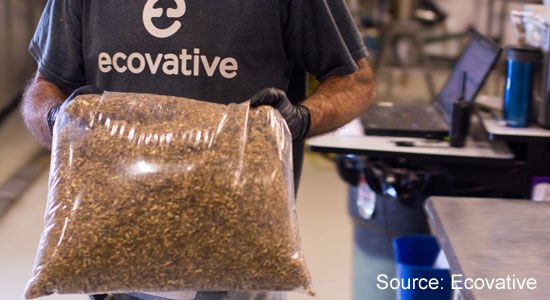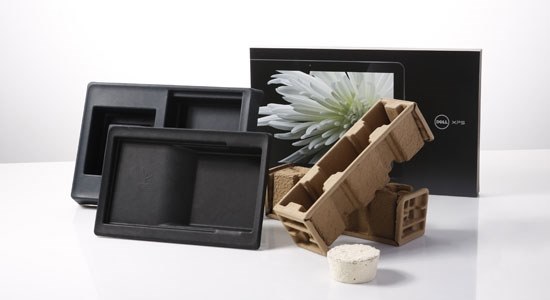Business Insider and author Erin Brodwin recently reported how a startup founded by two college friends is turning mushrooms into furniture, wall tiles, insulation and sustainable packaging —and doing business with major companies including Dell.
Co-founders Eben Bayer and Gavin McIntyre built the company on the breakthrough idea to use mycelium—“nature’s glue”—to grow high performance products that are safe, healthy and certified sustainable.
The Business Insider article visually takes you through just how Bayer and McIntyre harness mushrooms’ natural processes to grow mushrooms into strong, compostable forms that can replace petroleum-based packaging and engineered woods. Readers can view the process through the article’s photo slideshow—beginning with the problems with Styrofoam and onward to how the company takes agricultural waste purchased from local farms (things like old corn stalks)—mixes that with mushroom roots—and eventually outputs a material surrounded in a cozy layer of mushroom root fibers to be used in customized forms and allowed to grow into a solid.
For Dell’s use, those dried materials create mushroom packaging materials, specifically cushions for Dell PowerEdge R430 server platforms shipping in North America. The mushroom cushions replace a material that was previously made from petroleum-based foams.
“Next, workers take the bagged mixture of farm waste and mushroom roots (which the company calls "nature's glue") and places it on racks where it can grow. When we started, the focus was on insulation, but we realized this stuff could do a whole lot more than that," said Bayer.
Ecovative’s innovation is a valuable part of Dell’s portfolio of sustainable packaging materials and Dell has a history of finding smart, sustainably-sourced packaging solutions that others haven’t tried. In 2009, we were the first to use bamboo to make protective cushions and holding trays. In 2011, we were the first in our industry to use mushrooms grown in a form as cushioning material.
Because of our packaging reductions, we’ve eliminated 31 million pounds (14 million kilograms) of packaging materials and saved ourselves $65.9 million since 2009.
Examples of Dell’s sustainably sourced, easily recyclable or compostable packaging materials are pictured above. Clockwise from left, they include: bamboo-based trays for an XPS laptop, a Dell box made of corrugated cardboard, molded-pulp cushions that use wheat straw and recycled paper, and a divider cushion made from mushroom for server shipments.
Playing a role in the success of this small pioneering company is exciting for Dell to see—and personally it’s great to track how they are doing as Dell’s director of procurement for packaging and packaging engineering. Dell and Ecovative share the same DNA for innovative breakthroughs.
Ecovative is a great example of once-in-a-lifetime innovations that we must support, not just because it is the right thing for Dell’s business but also because it’s the right thing for the planet. Helping companies grow the market for sustainable packaging products helps us all—building a steady, global pipeline of innovative, sustainable biofabricated materials will make today’s alternative materials tomorrow’s norm.
In 2011 we began our work with Ecovative—the startup began as the founders’ college project at Rensselaer Polytechnic Institute —to pilot a mushroom-based packaging product for protecting U.S.-based Dell server shipments. While the company was small when we discovered its technology, we aggressively pursued a development partnership.
As reported in Dell’s FY14 Corporate Social Responsibility (CSR) Report:
“Dell was incredibly progressive to take the risk to even prototype with us,” said Bayer. “We could only support a limited set of customers at that time, and to have Dell be one of them was a big win. Not just because of brand recognition, but because of our philosophical alignment and their commitment to collaboration, which is rare—it’s great working alongside their packaging engineers.”
Ecovative’s innovations have attracted international attention among other major brands, and Dell’s use of them has helped us continue our leadership role and work toward our 2020 goals of sourcing 100 percent of packaging from sustainable materials and making 100 percent of packaging recyclable or compostable. By using innovative materials and smart designs in FY16, 93 percent of all Dell’s packaging (by weight) was sustainably sourced and easily recyclable, or compostable.
Here’s how our work with Ecovative and mushroom cushioning has evolved over the years:
- Dell and Ecovative partnered in 2011 to explore the use of its Mushroom® Materials technology to replace polystyrene products such as Stryofoam. The use of the energy stored (as carbohydrates and sugars) in the waste plant material to power the biological growth of the mushroom cushion intrigued us. It fit with our view of using sustainable, biological processes where we could, as a replacement for traditional oil- and hydrocarbon-based packaging. We spent the rest of that year in engineering development to characterize material properties and create a protective structure that would withstand our logistics environment (including our drop tests).
- We conducted a pilot on our R730 server with a major customer in 2012. Key outcomes of the pilot were end-end evaluation of integration into the manufacturing assembly line, packaging protection, unpackging at the customer campus, and ease of disposal and compostibility.
- Based on the pilot, we spent the next two years developing a fully functional supply chain and refining designs. In 2015 we began shipping the Dell PowerEdge R430 with incorporated mushroom cushioning. The R430 cushion base was previously manufactured from 100 percent expanded polyethylene (EPE). We replaced this with a lower cost design that replaced 65 percent of the cushioning with mushroom and corrugate components.
We expect Ecovative’s MycoFoam™ mushroom cushioning material to remain a part of our packaging materials portfolio.
Read Business Insider’s article for an insider’s look at how Ecovative makes engineered wood and furniture (MycoBoard™), building insulation, and packaging materials (MycoFoam™) from mushroom roots and farm waste.
For more on our Legacy of Good goals, visit Dell.com/legacyofgoodupdate



